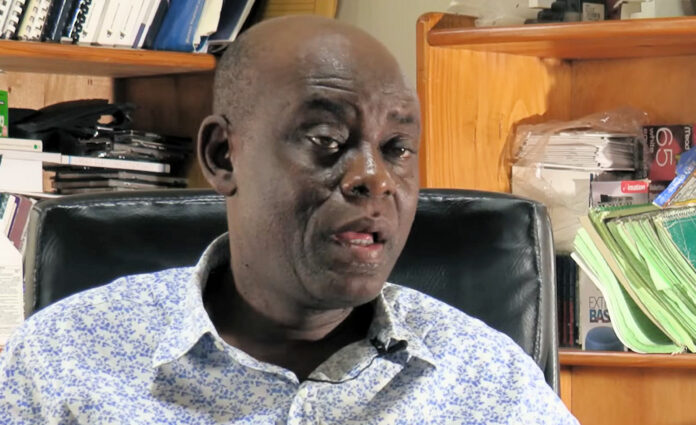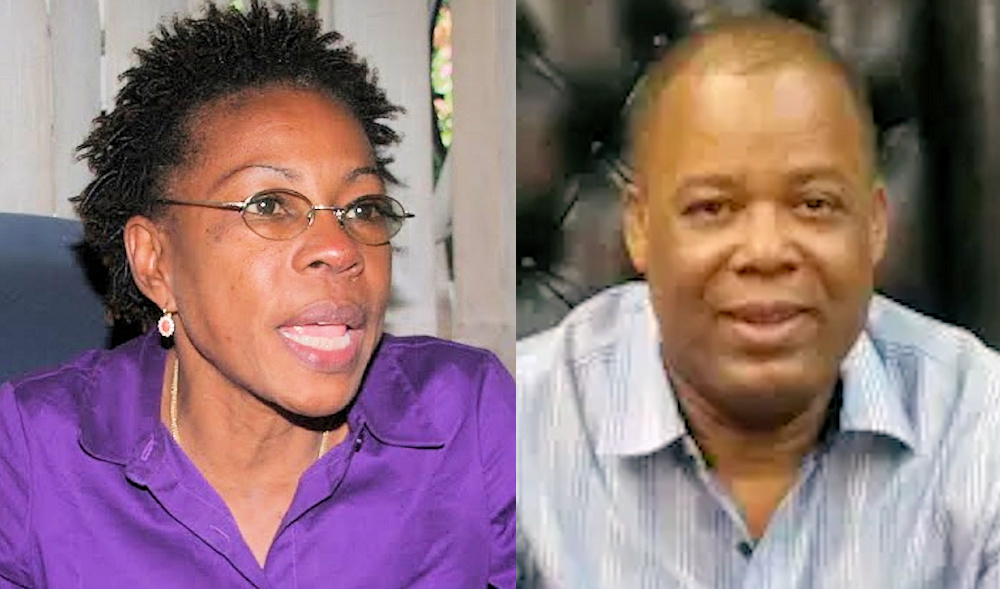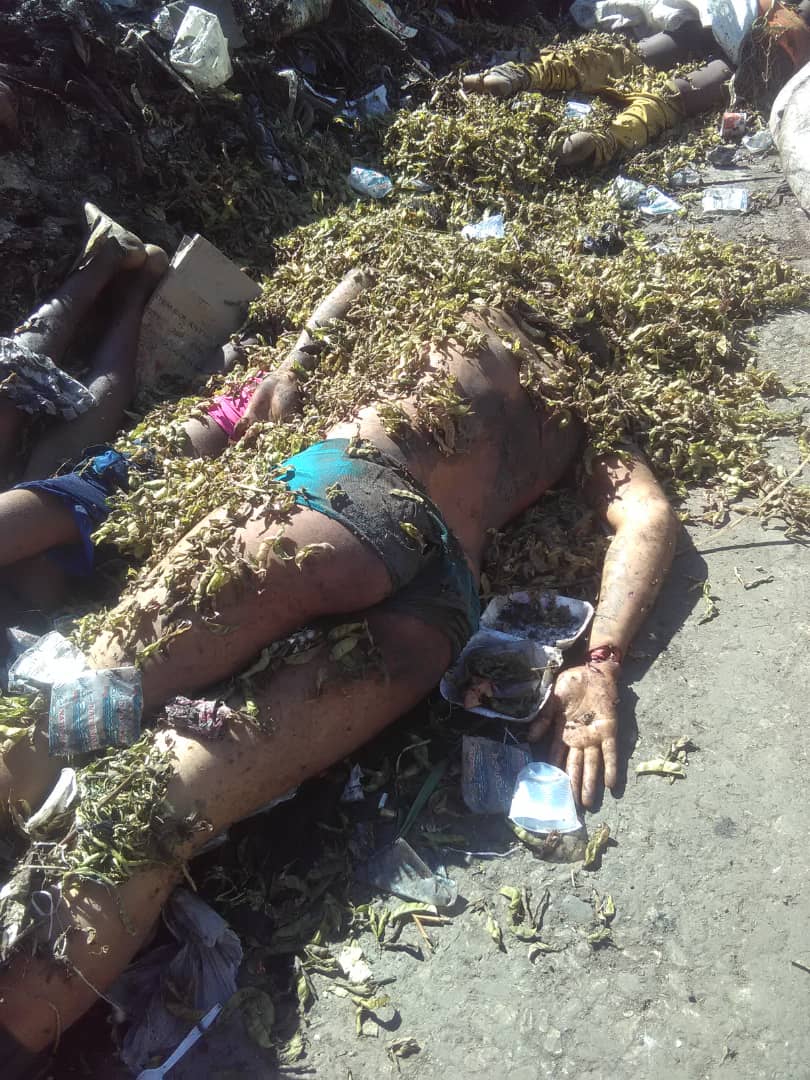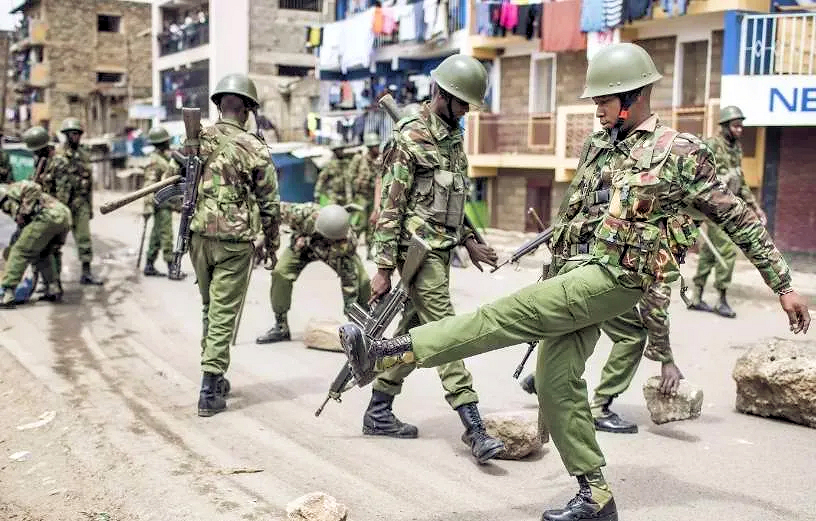
(The second of two parts) (Part 1)
Documents obtained by The Canada Files reveal that a Haitian “human rights” NGO had two reports, which it used to target political opponents, funded indirectly by the Canadian government through the NGO Avocats sans Frontières Canada (ASFC).
The National Human Rights Defense Network (RNDDH) receives an undisclosed amount of funding under the ASFC “Access to Justice and Fight Against Impunity in Haiti” (AJULIH) project for “advocacy activities.” This author previously explained the corruption of RNDDH and its director, Pierre Espérance.
In 2004, the Canadian government funded the RNDDH (then NCHR-Haiti) as part of a broader effort to ensure the criminalization and violent repression of Lavalas leaders and supporters. The RNDDH played a key role in destabilizing Jean-Bertrand Aristide’s democratically elected government by fabricating allegations of human rights abuses about Lavalas leaders and members before and after the 2004 coup d’etat. The RNDDH also gets funding from the National Endowment for Democracy (NED), described by its co-founder Allan Weinstein as doing “a lot of what …was done covertly 25 years ago by the CIA.”
Subsequent allegations and reports further reinforce the view that Espérance and the RNDDH are a political organization – with the facade of a human rights group – which uses their platform and funding to target and persecute political opponents.
ASFC funds RNDDH reports that target Pierre Espérance’s political opponents
ASFC funded two RNDDH reports as part of the AJILUH project. Global Affairs Canada confirmed it knew that the RNDDH got funding from their project when asked for comment.

Both reports contain a disclaimer: “This document was produced within the framework of the project ‘Access to justice and fight against impunity Haiti’ implemented by Avocats sans frontières Canada (ASFC) and its partners. The content of this document is the sole responsibility of the RNDDH and does not necessarily reflect ASFC’s points of view.”
The two reports, translated to English, are titled “Attacks on deprived neighborhoods: The RNDDH demands the end of the protection of armed gangs by the authorities in power” and “The reign of Prime Minister Ariel HENRY Or The fury of armed gangs”.
Both reports repeat RNDDH allegations that Jimmy Cherizier is a “gang leader” beholden to Haiti’s president Jovenel Moïse and, after he was assassinated, de-facto Prime Minister Ariel Henry, both members of the Haitian Tèt Kale Party (PHTK).
The first report is 25 pages long. Cherizier’s name appears 52 times. The report focuses on the alleged crimes of Cherizier’s G-9 coalition and ignores alleged crimes by other gangs. The G-9 alliance regularly battled the criminal gangs, including, at the time, 400 Mawazo and Izo’s 5 Second gang, which are omitted from the report.
Gangs opposing the G-9 alliance are responsible for virtually all the incidents of kidnapping and rape in Port-au-Prince.
Espérance must have been getting nervous. The first report was published Jun. 23, 2020. The day before, Haitian media began reporting on Cherizier’s successful negotiations with several gangs in Port-au-Prince for a cease-fire. Cherizier had united his neighborhood defense group (or vigilance brigade) with others in Port-au-Prince. He also claims to have successfully convinced some criminal gang leaders to cease illegal activity that harmed local residents and, instead, defend them against criminal gangs.
The coalition was named Revolutionary Forces of the G9 Family and Allies, AKA G9 or FRG9.
In July 2020, in response to the G9, the criminal gangs quickly made a federation known as “G-Pép.” These gangs often function as paramilitary forces for Haitian oligarchs and politicians. Ti Gabriel of the Cité Soleil gang, for example, had the support of Haitian oligarch Reginald Boulos, who, in turn, supported PM Henry’s political accord.
The first report alleges that Cherizier is “a powerful man, feared by the private business sector, the armed arm of President Jovenel Moïse.”
Conversely, while speaking about his public demand that Moïse step down, Cherizier said the G9 wanted him to “leave the country,” and he praised leaders such as Aristide and Platfòm Pitit Desalin leader Moïse Jean-Charles.
“The G-9 is not working for the regime, and the G-9 was not created by and is not working for the opposition,” Cherizier said. “It was created to never again have robberies, rapes, and kidnapping in our neighborhoods… but also for the ghettos to get their due, schools, clinics, hospitals, services, running water, infrastructure, and all the security which the rich neighborhoods get.”
The second report funded by ASFC was published on May 3, 2023. In this report, the RNDDH alleges that Cherizier and the G-9 coalition had deliberately committed acts of violence to justify a foreign intervention.
The report alleges that a gun battle in Bel-Air that occurred between Feb. 28 to Mar. 5, 2023 was “purely and simply political” and that “the authorities in place” decided to “use their armed gangs members of the coalition led by Jimmy Cherizier” to amplify the “perception of violence in Haiti and to encourage the international community to follow up on the requested military intervention.” No evidence is presented for these assertions in the report.
Contradicting the RNDDH’s allegations, Cherizier told a press conference on Aug. 16, 2023 that a foreign intervention force would be met with armed resistance if it did not immediately, upon entering Haiti, arrest Henry, corrupt oligarchs, and corrupt politicians who flood poor neighborhoods with guns. He also emphasized the disastrous consequences of the last foreign intervention in Haiti led by MINUSTAH.
Espérance and the RNDDH weaponize human rights reports against opponents, again
The first ASFC-funded RNDDH report repeats allegations made against Cherizier in a Dec. 1, 2018 RNDDH report entitled “The events in La Saline: from power struggle between armed gangs to State-sanctioned massacre.”
The first part of the title is corroborated by locals in La Saline at the time. The attacks that occurred in La Saline on Nov. 13, 2018 involved one gang, Nan Chabon, invading the territory of another gang, Projet Lasaline, for control of a local market. This brutal gang attack resulted in at least 23 murdered civilians.

The RNDDH also alleges that Cherizier participated in the attacks as part of a “state sanctioned massacre” of civilians in a neighborhood traditionally supportive of the Fanmi Lavalas political party.
In early November 2018, Jimmy Cherizier was a largely unknown figure in Haiti. According to Cherizier, he had formed a neighborhood defense group with other Haitian National Police (PNH) officers. The group had been formed to expel a criminal gang that had taken residence in lower Delmas. Cherizier had not yet announced the G-9 or attracted the attention of Haitian or international media.
In episode one of Dan Cohen and Kim Ives’ documentary, Another Vision, Cherizier alleges that Espérance offered to remove his name from the RNDDH’s upcoming report on the attacks in La Saline if he assassinated Marie-Yolène Gilles. Cherizier refused. Gilles, a former program director for RNDDH, had left the organization, accusing its director, Pierre Espérance, of corruption. She formed a competing human rights organization named the Open Eyes Foundation (FJKL) with lawyer and politician Samuel Madistin.
Cherizier was first targeted by the FJKL in a rushed report released three days after the attacks in La Saline. An analysis of this report is available in “Another Vision” and “The Open Eyes Foundation (FJKL) Is Not a Credible Human Rights Group,” an article I wrote last year. It is significant that Madistin is a legal representative for Reginald Boulos, who openly supported Ti Gabriel, the head of the Nan Brooklyn gang and the G-Pèp armed group alliance. The RNDDH also hired Madistin in 2004 by the RNDDH to represent the “victims” of the fabricated La Scierie massacre.
Espérance adopted the framing of the attacks in La Saline as a “state sanctioned massacre” alleged in the rushed FJKL report, despite a lack of evidence. Similar to Espérance’s efforts to tie an alleged massacre of civilians to Aristide and Fanmi Lavalas (FL) in 2004, the RNDDH’s La Saline report frames the civilian death toll as a result of a planned attack by the PHTK.
Roger Millien, an elected FL deputy, first alleged that the La Saline attacks were politically motivated and planned by PHTK politicians to target FL supporters. FL published a press release on Nov. 15, 2018, less than 48 hours after the attacks. This FL press release preceded any report or investigation. The press release “strongly condemns the massacre that the Jovenel and Céant regime conducted in La Saline,” explicitly blaming Jovenel Moïse for orchestrating the massacre.
Millien claimed to know about an alleged planning meeting for the attacks in La Saline attended by Cherizier, Nan Chabon’s leader, Ti Junior, and PHTK members. These allegations appear in the RNDDH report. He seems to be the sole source for this allegation.
Millien never offered an explanation on how he could know the details of a planning meeting he did not attend. Nor did he explain why he didn’t warn the residents of La Saline of the impending attack. According to a Jun. 21, 2019 UN report on the attacks in La Saline, the members of the Projet La Saline gang fled La Saline before Nan Chabon’s attack, indicating they may have been forewarned.
Both the FJKL and RNDDH reports acknowledge that Millien had a close relationship with the local gang, Projet La Saline. In an interview with Le Nouvelliste, Millien admits to knowing the leader at the time, Bout JanJan. Indeed, Millien drove an injured Bout JanJan and other gang members to the hospital after an attempted assassination in early November, he told Le Nouvelliste, in accordance with “international conventions” to “provide assistance to injured people even in times of war.”
Millien’s relationship with a local gang was not an uncommon feature of FL’s elected deputy MPs following the 2017 election.
Printemps Bélizaire, another elected FL deputy, was summoned for questioning in connection to the 2018 murder of journalist Vladimir Legagneur. He responded by claiming that he had a diplomatic engagement in Canada and couldn’t attend. It seems that he stayed there until the summons order expired. Bélizaire never testified.
Politician Joseph Lambert, a senator at the time, accused Bélizaire of helping gang leader Arnel Joseph avoid arrest. This accusation came three days after the RNDDH report on the attacks in La Saline explicitly blamed the PHTK government for orchestrating the events in La Saline.
Coincidentally, Bélizaire was officially summoned to answer questions about Legagneur’s murder was on Dec. 1, 2018, the day on which the RNDDH’s La Saline report was published.
Bélizaire also made headlines in June 2019 in Haiti when he was recorded saying in parliament that he “burn[ed] down police stations and murder[s] people with machetes.”
Did the RNDDH politicize a clash between two armed groups?
The RNDDH’s allegations that the Nov. 13, 2018 attacks in La Saline were politically motivated are contested by many residents.
Several locals believed the violence was strictly a result of gang warfare over control of the local market. Dozens of displaced Haitians who escaped Nan Chabon’s violence settled in Place d’Italy. They were interviewed by Berrick Estiodore for Kapzy News. The leadership of the camp denied the violence was political. Matyas Jean Norger, secretary of the Place d’Italy committee, said the gang violence was for “control” of the Croix-des-Bossales market.
Jean Renaud Félix, the director of the Croix-des-Bossales market at the time of the attacks, also believes the La Saline attacks were not politically motivated. He was interviewed in the documentary “Another Vision” and described the attacks as a clash between “two armed groups locking horns on the same block.”
Raphael Louigène, a social worker at Fondation St. Luc, a Catholic charity that works in Port-au-Prince’s poorest neighborhoods, told the Associated Press that the attacks “appeared to result from a fight over the right to extort marketplace merchants after one gang pushed out another.”
Washington’s clear paternity of the “transitional presidential council” has destroyed its legitimacy even before its confirmation.
The RNDDH report on La Saline does acknowledge that some residents believe the attacks were part of an ongoing inter-gang war to control the local market, it nonetheless concludes that the attacks are a “result of the co-existence and cooperation between governmental authorities and armed gangs.”
The campaign to frame the attacks in La Saline as strictly political was successful. Mainstream western media, as well as virtually every outlet on the left covering Haiti at the time, repeated the allegations that the attacks in La Saline were politically motivated. FJKL and RNDDH reports on La Saline were often the basis for the allegations.
Notably, The Center for Analysis and Research on Human Rights (CARDH), one of Haiti’s most prominent human rights groups, produced a report on the La Saline violence that did not suggest it was politically motivated. The CARDH report didn’t mention Jimmy Cherizier either. It mentions a relationship between a PHTK politician and Nan Chabon, but blames the state for being complacent and absent, not for organizing a massacre. Unlike the RNDDH and FJKL, CARDH has no known political affiliations that would cause accusations of bias around this event.
It speaks volumes that, in the same aforementioned AP report, Joel Noel, was identified as a “community leader” in La Saline. Referring to the Nov. 13, 2018 violence, he told AP “this is a political fight.” The fact that Noel replaced Bout JanJan as leader of the Projet La Saline gang is omitted from the article.
Predictably, in a separate AP report six months later, Noel, with his lips “stained purple from the wine he’d been drinking that morning,… accused Cherizier in the slayings.”
On Nov. 15, 2023, five years after the La Saline events, Espérance announced that the U.S. justice system had taken control of the La Saline dossier.
The Canadian government continues to meddle in Haiti’s affairs
Canada’s funding of the RNDDH through ASFC provides evidence that, while it may have retreated from publicly meddling in Haiti’s affairs, it still seeks to do so discretely. Canadian funding to the RNDDH indirectly affects political discourse in Canada and the U.S. by supporting Pierre Espérance’s platform for political influence.
Espérance was participated in the creation of the Montana Accord, announced in August 2021, which initially represented a broad coalition of political parties, civil society organizations, and peasant groups. Indeed, once the accord was announced, it was left at the RNDDH’s office so representatives of civil society organizations could sign the document.
Support for it has shrunk significantly since the accord was announced. Two years after its initial announcement, the coalition behind the accord now only represents a small fraction of Haitian society, functioning more as a civil society front for a sector of the Haitian bourgeoisie than a coalition with broad support. The coalition was once considered the main rival to Ariel Henry’s political alliance.
By funding the RNDDH, the Canadian government indirectly provided support to the leaders of the Montana Accord coalition. The same can be said of Washington via funding from the National Endowment for Democracy (NED) and the Open Society Foundation. Over the two-year period following the announcement of the Montana Accord, this funding indirectly played a role in maintaining support for a controlled opposition to Henry’s rule through Espérance’s efforts to advocate for it.
Espérance remains an enthusiastic supporter of the Montana Accord, even as its popularity has plummeted among Haitians. Espérance has written several articles for the liberal think-tank Just Security pleading to the U.S. government to shift support from Ariel Henry to the Montana Accord.
When asked about Pierre Espérance’s obvious political activity while acting as RNDDH’s director, an ASFC representative claimed that: “We are a non-political organization and we work on capacity-building for human rights organizations, not individuals.”
ASFC also explained that they apply the “principle of subsidiarity” with their partners. “Our partners are independent, and we offer them support without influencing their positions or endorsing them in their entirety,” they said.
It is possible that ASFC is unaware of the long list of reports that conclude that the RNDDH is not a legitimate human rights group. ASFC’s adherence to the “principle of subsidiarity” seemingly allows them to ignore RNDDH’s clearly political nature.
The Canadian government is ultimately accountable for this funding and shares responsibility for its role in the Ottawa initiative, the 2004 coup, and funding of NCHR-Haiti to pursue the case against then-Prime Minister Yvon Neptune.
The Montana Accord leadership are also tied to the 2004 coup d’etat
One of the founders and spokespersons for the Montana Accord is Magali Comeau Denis. Like Espérance, she had a role in the anti-Lavalas campaign before and after the 2004 coup.
Comeau Denis was one of the members of the “Council of the Wise” selected for midwifing the coup government. She was made Culture Minister in the Latortue/Boniface coup regime.
Ariel Henry was also a member of the Council of the Wise.
Comeau Denis’ unelected position in government was a result of her participation in the propaganda campaign against Aristide’s democratically elected government. Comeau Denis, leader of the Collectif Non, co-wrote a letter in September 2003 signed by dozens of Haiti’s elite, calling Aristide’s government a “tyrannical power” experiencing “totalitarian drift.” The main objective of the Collective Non was to boycott the celebration of Haiti’s Bicentenary on Jan. 1, 2004 for the benefit of the former colonialist powers.
Similar to Espérance accusations against Neptune, Comeau Denis also made baseless accusations of murder against another FL leader, Father Gérard Jean Juste, as part of a campaign to criminalize the extremely popular party and suppress dissent after the 2004 coup.
Comeau Denis last year traveled to Washington with Espérance to lobby the U.S. government to shift their support to their dwindling coalition. They met with Juan Gonzalez, Deputy Assistant Secretary of State for Western Hemisphere Affairs and Under Secretary of State for Hemispheric Affairs Brian H. Nicholls on May 30, 2023. This was followed by a meeting with “authorities in the Pentagon” on Jun. 2, 2023.
Five days later, on Jun. 7, Washington announced new sanctions against one of Jovenel Moïse’s closest advisors, former prime minister Laurent Lamothe.
While visiting Washington, Espérance spoke to the New York Times. Referring to the recent popular uprising in Haiti known as Bwa Kale, he said “the rise of the vigilante movement… underscores the international community’s failure to address the crisis.” In other words, he wanted Washington to shift support to the Montana Accord, which would then approve a militarily intervention to prevent a popular uprising.
The MSS to ensure Haiti’s neocolonial status
The Multinational Security Support Mission (MSS) is fundamentally an occupation force, an imperialist tool for maintaining hegemony and preventing a popular uprising in Haiti.
Washington and its proxy, CARICOM, are currently leading negotiations with leaders of Haiti’s “political class” to form a Presidential Council. Agreeing to the MSS is a precondition for joining these negotiations.

Among the confirmed representatives are Fritz Alphonse Jean of the Montana Accord group; Leslie Voltaire of Fanmi Lavalas; Louis Gérald Gilles of the December 21 Agreement political group, allied with Ariel Henry; Laurent Saint-Cyr with the private sector (former member of Henry’s transitional council and President of Haitian Chamber of Commerce); Edgard Leblanc Fils who represents the January 30th Collective (a coalition of political parties); Emmanuel Vertilaire with the Pitit Desalin party; and Augustin Smith with the EDE/RED political sector.
In late January, former FL leader Maryse Narcisse told the press that she “supports the protest movements across the country to demand the resignation of Mr. Henry.” This seemed to be a tacit endorsement of the people’s movement that supported Guy Philippe’s call to remove Henry from power, and a surprising turn of events.
FL’s decision to support Washington’s efforts to form a presidential council show the party has moved in the opposite direction, to the dismay of many party stalwarts.
Washington’s clear paternity of the “transitional presidential council” has destroyed its legitimacy even before its confirmation. Clearly, most Haitians reject the body.
It was until recently in a race for power with another transitional council formed inside Haiti. This other council proposed on Mar. 3, 2024 was to include Guy Philippe as president, Françoise Saint-vil Villier from the religious sector’s National Spiritual Council of Churches (CONASPEH), and ex-Court of Appeals judge Durin Junior Duret.
Washington’s plans in Haiti revolve around the MSS, which Kenyan police were supposed to lead. But Kenya’s high court has blocked deployment of Kenyan forces. William Ruto had promised to deploy the police force anyway. Henry’s recent resignation, however, forced Ruto to pause the deployment, as it requires the consent of Haiti’s government.
Kenya has already sent 200 police officers on the ground in Haiti. In addition, the U.S. Special Forces have been deployed as well to train and advise the PNH. Global Affairs Canada has also committed the RCMP to provide “technical training” to PNH officers as part of the MSS.
The Canadian government remains an enthusiastic supporter of the MSS. Canadian foreign affairs minister Mélanie Joly announced this February that Canada “will allocate $123 million in funding to support Haiti, including $80.5 million to support the deployment of the MSS”.
The same announcement included a reminder that “since 2022, Canada has committed more than $300 million in international development, humanitarian and security assistance funding to Haiti.” In addition, Canada has contributed $57 million to “reinforce” the PNH.
This highlights that Canada has played a key role in maintaining funding for Haiti’s National Police force. Canada is the second-largest bilateral donor to Haiti after the U.S.
The RNDDH, funded by the Canadian government, is among these naysayers against Haitian popular movements for genuine democracy. Espérance, critical of the Bwa Kale movement and any other local leader who resists the violence of criminal gangs, using Canadian government money for write reports attacking leaders like Cherizier, who seek to change Haiti’s status quo.
An earlier version of this article was first published by The Canada Files, that country’s only news outlet focused on Canadian foreign policy. Travis Ross is a teacher based in Montreal, Québec. He is also the co-editor of the Canada-Haiti Information Project at canada-haiti.ca. Travis has written for Haiti Liberté, Black Agenda Report, The Canada Files, TruthOut, and rabble.ca. He can be reached on Twitter.










[…] the center of this campaign are two U.S.-backed “human rights groups,” the RNDDH and FJKL. Multiple investigations from several sources have shown they routinely use their funding […]
[…] years past, including its reports on massacres in La Scierie (2004, when it was called NCHR-Haiti), La Saline (2018), and Delmas 32 […]
[…] Travis Ross has also deeply researched the November 2018 violence in La Saline and concludes that the ensuing “human rights” reports, […]